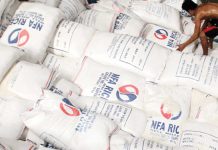
MANILA – Consumer confidence in the remained negative in the first quarter of 2019, the Bangko Sentral ng Pilipinas (BSP) said Thursday.
Consumers’ overall confidence (CI) improved to -0.5 percent from -22.5 percent in the fourth quarter of 2018, results of the latest BSP Consumer Expectations Survey (CES) showed
“The higher, albeit negative, CI indicates that the number of households with optimistic views considerably increased, but was still lower than those who think otherwise,” BSP Department of Economic Statistics head Redentor Paolo Alegre Jr. said.
The CI is computed as the percentage of households that answered in the negative with respect to their views on a given indicator.
The consumer index measures the average direction of change in three indicators – overall condition of the economy, household finances, and household income.
Alegre said, respondents of the latest CES attributed their improved outlook during the first quarter on the following:
- additional income
- improvement in peace and order
- availability of more jobs
- good governance
BSP deputy governor Diwa Guinigundo said that the issue of the government operating under a reenacted budget during the first quarter was not factored in the survey.
“Tingin ng mga ordinaryong consumer, malayo sa bituka. Sa madaling sabi hindi sila masyadong apektado kasi nga mas madaming trabaho na available,” Guinigundo said.
The BSP official added that the improved consumers’ sentiment was carried to the next quarter as the CI reverted to positive territory at 10.7 percent and the year ahead CI also rose to 28.4 percent.
“The consumer outlook was more upbeat for the next quarter and the year ahead due to expectations of additional/high income and availability of more jobs,” Guinigundo said.
“Respondents anticipated stable prices of goods and salary increases for the next 12 months,” he said.
The first quarter CES was conducted from February 5 to 16, covering a sample size 5,562 households in Metro Manila and areas outside the National Capital Region.
Of the sample size, 5,396 households responded to the survey or a response rate of 97 percent.
Relatively, index for the Business Expectations Survey (BES) got better at 35.2 percent from 27.2 percent in the survey done in the last quarter of 2018.
Reasons cited by the respondents include more business activities in line with the election period, higher orders and consumer purchases due to decelerating inflation, higher government spending on infrastructure, introduction of new and enhanced business strategies and processes, and expansion of business and new products.
Guinigundo said this improvement was also posted by the quarter-ahead index from 29.4 percent to 52 percent, which is the highest level since the last quarter of 2016.
He is optimistic that results of this quarter’s BES and CES will be sustained in the next quarter.
“I think both surveys will indicate firmer and better sentiment, more optimistic sentiment. The negative confidence index for the Consumer Expectations Survey may not move to positive territory,” he said.
He, however, pointed out that risks remain and these include the El Nino phenomenon, which authorities expect to last until the early part of the third quarter, and the rising oil prices in the international market.
“All told that could also impact on expectations by both the consumers and businesses,” he added. (PNA)







